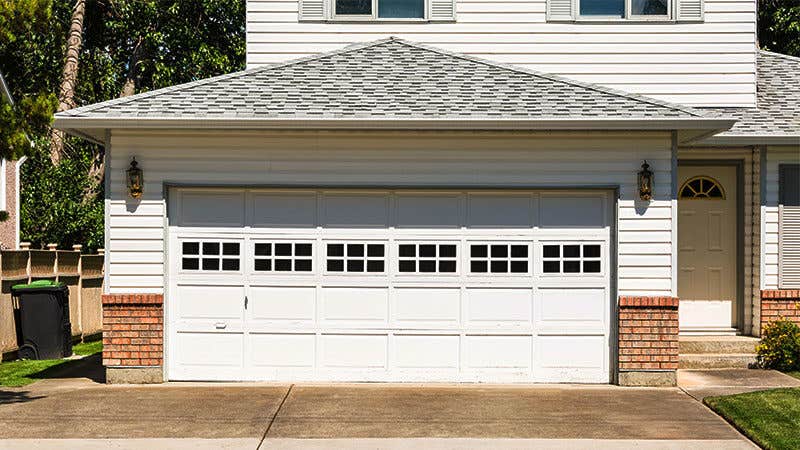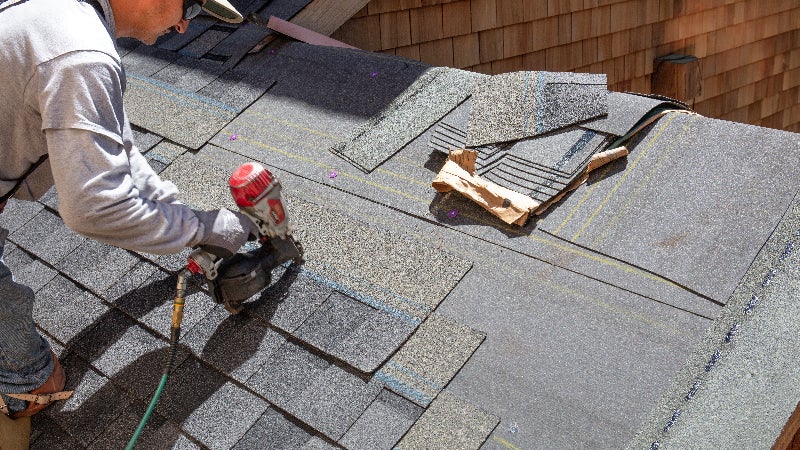How much do garage doors cost?

Replacing garage doors: It’s not the sexiest of home remodeling projects. But it’s an important one — not only to protect your car(s) but to preserve your home’s value. New garage doors are among the top four items that appeal to potential home buyers, according to the National Association of Realtors most recent Remodeling Impact Report. And they’re one of the few home renovations that regularly recoup their full cost (or close to it).
As with any home improvement item, garage door prices vary, from a few hundreds to a few thousands. The national average to install garage doors, according to HomeAdvisor, runs around $1,200 with a typical range between $754 and $1,587 (including labor).
A number of factors will impact your garage project’s final price tag, from door size to the type of garage door opener and architectural elements of the home. With a little research, though, you can find tips on how to save and some smart financing options for garage door projects.
Average cost of garage doors
On the low end, garage door installations run around $260 to $375; on the high end, $2,100 to $4,540. However, the actual cost of the project may vary because several different factors go into determining the cost of both the garage doors themselves and their installation, including:
- Location: Your new garage door cost will vary according to where you live. The general rule is that the more expensive the cost of living is in your area, the more expensive a home renovation project will be, and that includes garage doors.
- Garage size: Obviously, the job cost is going to rise with the number of autos the garage has to accommodate. Three-car garages can run as high as $6,000 to $7,000 total to equip and install, according to LawnAdvisor.
- Removal and disposal: The removal and disposal of your old garage door is typically included in quotes for the cost to replace a garage door. However, you may see it listed as an additional surcharge on top of the installation costs on your estimate.
- Resizing the opening: Your contractor may need to resize the opening if your new garage door is a different size than your old one, which can add to the overall cost. As a rule of thumb, make sure your replacement is the same size as your current garage door if you want to keep the cost down.
- Materials used: Garage doors come in a variety of different materials, including steel, aluminum, wood, composite wood, fiberglass and vinyl. Each one has a different price point and the material you choose to use will have an effect on the overall cost.
- Hardware replacement: Most hardware replacement costs are included in any quotes you receive, but just know that if any springs, hinges or bolts need to be replaced to accommodate your new garage door there will likely be an additional charge. It matters if you can reuse an existing motorized opener or tracks, too.
Tips to save on garage door replacement and installation
You may be wondering what you can do to save money when replacing garage doors. Luckily, there are a few things that you can do to keep the cost as affordable as possible, including:
Choose a basic door
Garage doors come in a wide variety of materials and finishes and your choice of materials can have a substantial impact on how much you pay for the replacement and installation. If saving money is your main goal you should pass on buying higher-end options, like windowed or fiberglass garage doors, and choose a basic option in a standard size instead.
Keep the design simple
Multi-section garage doors — often equipped with handles, panels and other details that make them look like front or carriage house doors — are attractive, admittedly, but those extra design elements will cost you. If you can stand it, stick with the old-fashioned tilt-up door (several small connected panels that slide up in one piece). If you do go sectional, double doors are a bit more economic than single ones.
Pass on high-tech features
Almost anything in your home can include smart home technology, including your garage doors. You may be given the option to control your garage door with your smartphone or bluetooth, but going digital will add to your final price tag. Choosing a manual garage door over an electronic one will also help you save money.
Get the warranty
No one likes to think about their new purchase breaking or needing repairs, but it happens, and in the long run a warranty can save you a lot of money. While the warranty may cost more upfront, you’ll be covered if something happens.
Reasons to invest in a new garage door
Beyond keeping your car safe and snug, there are several good reasons for investing in a new garage door.
- Boost curb appeal: Replacing your garage door is a great way to pump up your home’s appearance, which will help with resale value should you decide to move.
- High return on investment: The National Association of Realtors’ survey found that homeowners were able to recoup 95 percent of the overall cost of replacing their garage doors. Remodeling’s 2021 Cost vs. Value report found just about the same (93.5 percent); not only has the ROI been in that range for years, it has actually increased since 2010.
- Improved security: According to the National Association of Certified Home Inspectors, approximately 9 percent of burglars break into a home through the garage door. Getting a new one and keeping it in good condition can retard them.
- Save energy costs: Today’s garage doors are better able to keep your home cool in the summer and warm in the winter. So if you replace a poorly insulated garage door with one that has better insulation, you may find that you’ll save on your energy bills.
- Improved utility: An insulated garage also creates a more comfortable and usable space.
- Reduced maintenance: Older garage doors may require fresh paint or regular repairs. A state-of-the-art garage door that’s better equipped to withstand the elements may ultimately save you on home maintenance costs as well.
Garage door financing options
The cost of replacing your garage doors can be significant. Luckily, you have some great financing options at your disposal if you aren’t prepared to pay for the project out of pocket.
Personal loan
If you haven’t built much equity in your home, a personal loan may be your best option. This type of loan is usually unsecured, which means you won’t have to put up any property as collateral, but you will have to meet the restrictions of the lender, which generally means having a higher credit score and income. But personal loans are a good way to finance a garage door replacement because they can be taken out for any reason, and approval usually comes quickly. Be aware, though, that the interest rates are often higher than you’ll get with other financing options.
Home equity loan
A home equity loan works similarly to a personal loan in that you’ll receive a lump sum of money and be expected to pay it back over time at a fixed interest rate. The difference is that with a home equity loan you’ll borrow against the equity that you have built up in your home — that is, the portion of the home you own outright.
Since garage door prices are often fixed — rarely are there surprise costs or overruns — a home equity loan is a good option at an affordable interest rate. That said, keep in mind that while your interest rate will likely be lower than you’d get with a personal loan, your home will be used as collateral, and so at risk if you default on the debt.
Home equity line of credit
A home equity line of credit works more like a credit card than a fixed loan. With a HELOC, you’ll be given access to a line of credit equal to a percentage of your home’s equity and can borrow against it for a set period of time, usually 10 years. During that time, called the draw period, you’ll typically only be required to make payments on the interest. After the draw period is over you’ll be expected to make payments on both the principal and the interest. However, any money you repay can be borrowed again.
A HELOC might be overkill just for a garage door installation. However, it could be a smart choice if the garage project is part of a larger home remodeling plan — or you’re building a new, luxe garage from scratch — and you’re not sure what the total tab will be.
Learn more:
You may also like

The average cost of Christmas: Gifts, food, decorations and more

Who pays closing costs in Oregon?

How much does it cost to replace a roof?

What does it cost to enclose a porch?


